Swiss GDP grew 0.4% qoq in Q3, accelerated from Q2’s 0.3% qoq and beat expectation of 0.1% qoq. SECO said: “Exports of chemical and pharmaceutical products and energy were key contributing factors. In other areas, the impact of the subdued international environment was felt more strongly. The economic slowdown is being borne out on the whole.”
BoJ Kuroda: YCC would make fiscal policy even more effective
BoJ Governor Haruhiko Kuroda said a mix of fiscal and monetary policy measures is a standard way to support the economy. The challenges Japan is facing, including recent natural disasters and impact from overseas slowdown, “should be better be addressed by government with fiscal policy and structural policies”.
On monetary side, the yield curve control of BoJ, which intends to maintain short- and long-term rates quite low, “would make fiscal policy even more effective”. He added, “which intends to maintain short- and long-term rates quite low, would make fiscal policy even more effective.”
YouGov predicts 68 Conservative majority in UK Dec elections
Sterling jumps broadly after YouGov projected that the Conservative Party is on track to win its biggest majority in more than three decades in the upcoming election on December 12. The results, if realized, would put UK on track for Brexit with a deal finally on January 31.
According to the poll, Conservatives would win 359 seats, giving it a majority of 68. Labour is predicted to win 211 seats, SNP 43, and Lib Dems 13. “As expected, the key thing deciding the extent to which each of these seats is moving against Labour are how that seat voted in the European Union referendum,” said Chris Curtis, YouGov’s political research manager. “This is allowing the Tories to overturn quite substantial majorities.”
GBP/CHF’s rally resumed by taking out 1.2892 resistance and hits as high as 1.2931 so far. Near term outlook will now remain bullish as long as 1.2673 support holds. Rise from 1.1674 is targeting 1.3399 key structural resistance next.
Trump signed HKHRDA into law, China and Hong Kong government oppose
US President Donald Trump finally signed the bipartisan supported Hong Kong Human Rights and Democracy Act overnight. A second bill to ban export of crown-control munitions to Hong Kong was also signed. Trump said, “I signed these bills out of respect for President Xi, China, and the people of Hong Kong. They are being enacted in the hope that Leaders and Representatives of China and Hong Kong will be able to amicably settle their differences leading to long term peace and prosperity for all. ”
Republican Senator Marco Rubio, a main driver and sponsor of the bill, said, “In an overwhelming display of bipartisan unity, Congress passed our Hong Kong Human Rights and Democracy Act, and I applaud President Trump for signing this critical legislation into law. I look forward to continuing to work with the administration to implement this law.” Democrat House Speaker Nancy Pelosi said, “If America does not speak out for human rights in China because of commercial interests, we lose all moral authority to speak out elsewhere”.
The Chinese Foreign Ministry said the act “severely infringed on Hong Kong affairs, seriously interfered in China’s internal politics, and gravely violated international laws and the basic principles of international relations”. It added, “it is a blatant move of hegemony that the Chinese government and the Chinese people firmly oppose”. The China-appointed Hong Kong Government also said, “the two acts are unreasonable”, and they “will also send an erroneous signal to protesters, which is not conducive to alleviating the situation in Hong Kong”.
The HKHRDA aims to back Hongkongers in defend of their autonomy, promised by China in the Sino-British Joint Declaration. Hong Kong’s status will be reviewed by the US State Department, annually, to justify continuation of the favorable trading terms. The law also threatens sanctions for human rights violations by Hong Kong Government officials.
Market reactions are so far muted as the main risk remains on outcome of US-China trade deal phase one. Talks are ongoing and no one has eve dropped a hint on when it will be completed.
Fed Beige Book: Modest expansion but manufacturing stagnant
In Fed’s Beige Book report, it’s noted that economic activity expanded “modestly” in the period. Most Districts reported “stable to moderately” growing consumer spending. More Districts reported expectation in manufacturing, but the “majority” continued to experience no growth.
Employment continued to “rise slightly over all”. But reports were “mixed” in manufacturing employment, with reports of rising headcounts and layoffs. “Moderate wage growth” continued across move districts and wage pressures “intensified” for low-skill positions. Prices rose at a “moderate pace” and “firms generally expected higher prices going forward.
US PCE unchanged at 1.3%, core PCE slowed to 1.6%
US Personal Income rose less than 0.1% October while spending rose 0.3%. Headline PCE inflation was unchanged at 1.3% yoy, above expectation of 1.2% yoy. However, core PCE slowed to 1.6% yoy, below expectation of 1.7% yoy.
US Q3 GDP grew 2.1%, revised up from 1.9%
According to the second estimate, US GDP grew 2.1% annualized, revised up from first estimate of 1.9%. With the second estimate for the third quarter, upward revisions to private inventory investment, nonresidential fixed investment, and personal consumption expenditures (PCE) were partially offset by a downward revision to state and local government spending.
US durable goods orders rose 0.6%, ex-transport orders rose 0.6%
US durable goods orders rose 0.6% to USD 248.7b in October, well above expectation of -0.5% contraction. ex-transport orders rose 0.6%, also above expectation of 0.2%. Excluding defense, new orders increased 0.1%.
US initial jobless claims dropped to 213k vs exp 223k
US initial jobless claims dropped -15k to 213k in the week ending November 23, better than expectation of 223k. Four-week moving average of initial claims dropped -1.5k to 219.75k.
Continuing claims dropped -57k to 1.640m in the week ending November 16. Four-week moving average of continuing claims dropped -13k to 1.681m.
Lagarde: ECB tasked to ensure Euro is safe and stable
ECB President Christine Lagarde said in a speech that the existence of Euro is to secure that trust in money so that people can focus on what really matters to them. And that’s the reason why ECB’s mandate and objectives reflect the well-known “functions of money”. Policy makers are tasked to “ensure that euro is safe and stable”.
The Euro also serves as the “most tangible symbol of European integration”, and “bears witness to the degree of integration we have achieved.” Support in the Euro is there with “76% of our citizens are now in favour of the single currency”. Though, she also warned that “trust takes years to build, seconds to break and forever to repair”.
New Zealand trade deficit narrowed slightly to NZD 1B
New Zealand goods exports rose 4.3% yoy to NZD 5.0B in October. Goods exports dropped -1.4% yoy to NZD 6.0B. Trade deficit narrowed slightly to NZD 1.013B, down from NZD -1.319B, in line with expectations.
Exports to China rose NZD 279m to NZD 1.5B, led by rises in milk powder, lamb and beef. Exports to Australia was little changed at NZD 791m. Imports from China dropped NZD -100m to NZD 1.4B. Imports from EU dropped slightly by NZD-9.9m to NZD 965m.
BoJ Sakurai: Increasing need to be mindful of side-effect of low-rate policy
BoJ board member Makoto Sakurai, warned in a speech, “in guiding monetary policy, there’s an increasing need to be mindful of the side-effect of continuing our low-rate policy such as that on Japan’s banking system.”
“If there’s a crisis that could disrupt Japan’s financial system,” he noted, “a bold policy response is necessary”. However, ” if the overseas slowdown driven by trade woes is moderate, and the speed at which it affects Japan’s economy is slow, we have room to scrutinise economic indicators in deciding on policy”.
He added, “the next half-year is when we need to carefully scrutinise economic developments”, including the impact of sales tax hike and global slowdown.
Trump: We’re in the final throes of trade deal with China
US President Donald Trump said yesterday, “we’re in the final throes of a very important deal”. He hailed again that it’s “one of the most important deals in trade ever” and “it’s going very well. But, “at the same time we want to see it go well in Hong Kong”. He added, “I think that President Xi can make that happen. I know him and I know he’d like to make it happen”, without elaboration.
For now, it’s unsure when Trump will sign the Hong Kong Human Rights and Democracy Act. The bill was for backing Hongkonger’s defense of its autonomy, and was passed by both Senate and House last week nearly unanimously. China has warned by retaliation if Trump signs it into law.
Separately, White House adviser Kellyanne Conway said US and China were “getting really close” on the phase one trade deal. And the US will “continue to negotiate”. She added, “those forced tech transfers, the theft of intellectual property, the trade imbalance of a half a trillion a year with the world’s second largest economy, China – this makes no sense to people.”
US consumer confidence dropped to 125.5, softening business and employment conditions
US Conference Board Consumer Confidence dropped to 125.5. in November, down from 126.1, missed expectation of 126.9. Present Situation Index dropped from 173.5 to 166.9. Expectations Index rose from 94.5 to 97.9.
“Consumer confidence declined for a fourth consecutive month, driven by a softening in consumers’ assessment of current business and employment conditions,” said Lynn Franco, Senior Director of Economic Indicators at The Conference Board. “The decline in the Present Situation Index suggests that economic growth in the final quarter of 2019 will remain weak. However, consumers’ short-term expectations improved modestly, and growth in early 2020 is likely to remain at around 2 percent. Overall, confidence levels are still high and should support solid spending during this holiday season.”
US goods trade deficit narrowed to USD 66.5B, both imports and exports declined
US goods trade deficit narrowed -5.7% mom to USD -66.5B in October, well below expectation of USD -71.3B. Exports of goods dropped USD -0.9B to USD 135.3B. Imports of goods dropped USD -5.0B to USD 201.8B. Wholesales inventories rose 0.2% mom to USD 676.1B, matched expectations.
Fed Kaplan: Mid-cycle adjustment is over for the time being
Dallas Fed President Robert Kaplan said monetary policy is “in the right place now” And the mid-cycle adjustment” is over “for the time being”. Though, he added that Q4 is “going to be weak” on destocking due to some pessimism over the past few months. But “we thing things will stabilize. We’ve got a good chance to grow at 2% next year.”
Kaplan also said that “weak manufacturing, weak global growth, weak business investment all relate to uncertainty regarding trade,” he said. “If that got stabilized, I think we’d have a chance to see those measures improved.”
RBA Lowe: Negative interest rates extraordinarily unlikely, point for QE won’t be reached
RBA Governor Philip Lowe said in a speech that negative interest rates in Australia are “extraordinarily unlikely”. He added that Australia is “not in the same situation” as faced in Europe and Japan, with stronger growth prospects, better banking system, demographic profile, without deflation. Also, internationally, it’s not clear that negative interest rates has been a success.
Also, the threshold for undertaking QE “has not been reached” and he didn’t expect it to be reached in the near future. He also didn’t expect the country to reach the point where “QE could help promote our collective welfare”. QE would become an option to when cash rate hits 0.25%, “but not before that”.
Lowe also said “the Board continues to discuss what role it can play in ensuring that this progress takes place and how it might be accelerated. It recognizes the benefits that would come from faster progress, but it also recognizes the limitations of monetary policy and the importance of keeping a medium-term perspective squarely focused on maximizing the economic welfare of the people of Australia.”
German Gfk consumer sentiment rose to 9.7, economic expectations jumped
Germany Gfk Consumer Sentiment picked up again in rose 0.1 pts to 9.7 for December, matched expectations. Rolf Bürkl, consumer expert at GfK said: “The exceptionally high levels of consumer confidence among German consumers have significantly contributed to preventing a recession in Germany in the third quarter. Private consumption has thereby perfectly fulfilled its role as an important pillar of the economy. Consumers are therefore optimistic about the upcoming holiday season, one of the busiest times of year for a number of retail industries such as consumer electronics and toys. How the year as a whole will be evaluated is determined during this period. And the retail sector can certainly look forward to this period with a healthy dose of optimism.”
Economic Expectations also improved drastically from -13.8 to 1.7. Gfk noted: “This decline in pessimism is most likely due to the trade war between the US and China showing tentative signs of easing during recent days. In addition, it is clear that an increasing number of Germans are hopeful that after the forthcoming elections in the UK a decision on Brexit will be made.”
RBA Debelle: Strong employment not generating pick-up in wages growth
RBA Deputy Governor Guy Debelle said in a speech the increase in labor supply in Australia has meant that “the strong employment outcomes in recent years has not generated the pick-up in wages growth that might otherwise have occurred”. He expected “wages growth to remain largely unchanged at its current level over the next couple of years.”
He noted that “dynamics of participation and unemployment flows will have an important bearing on wages growth as well as household income growth”. Also, “the more wages growth is entrenched in the 2’s [2-3 per cent range], the more likely it is that a sustained period of labour market tightness will be necessary to move away from that.”
RBA has so far failed to push unemployment down to the 4.5% level, which should generate sustainable wages growth and inflation. Markets are expecting more policy easing from the central bank next year, including possibility of QE.
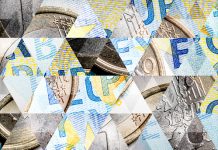



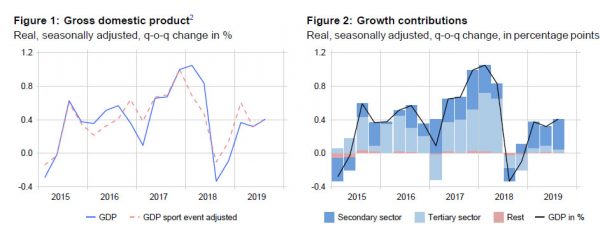
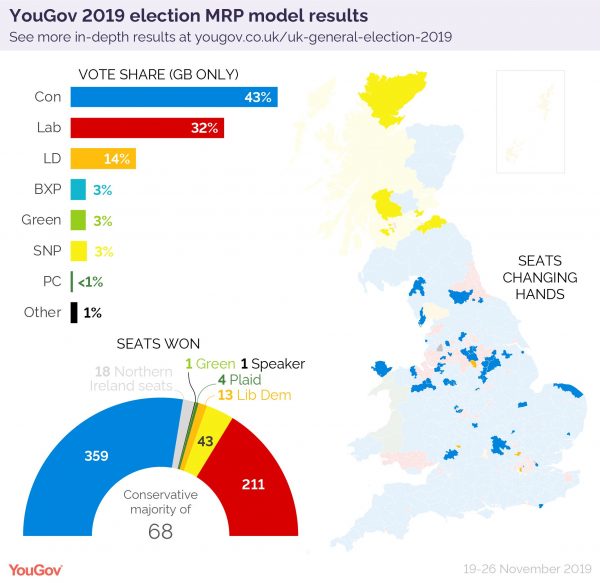
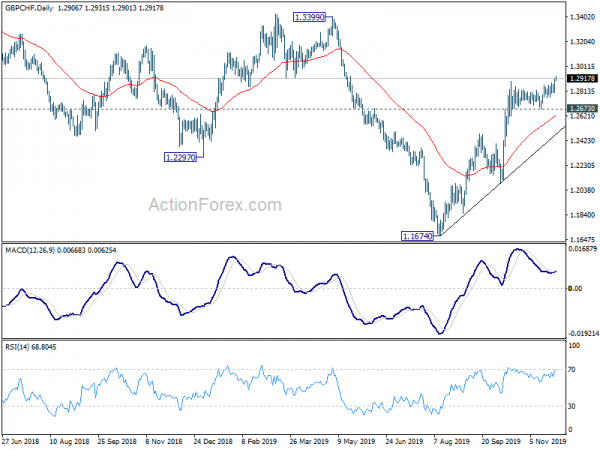
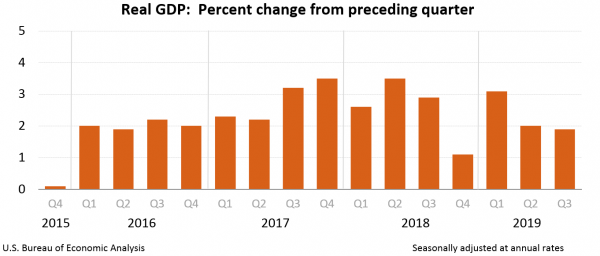
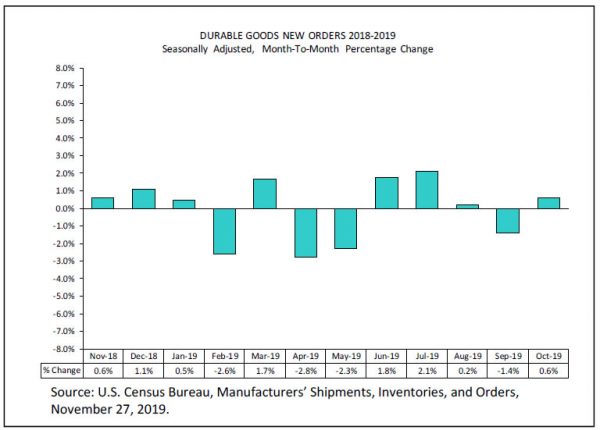
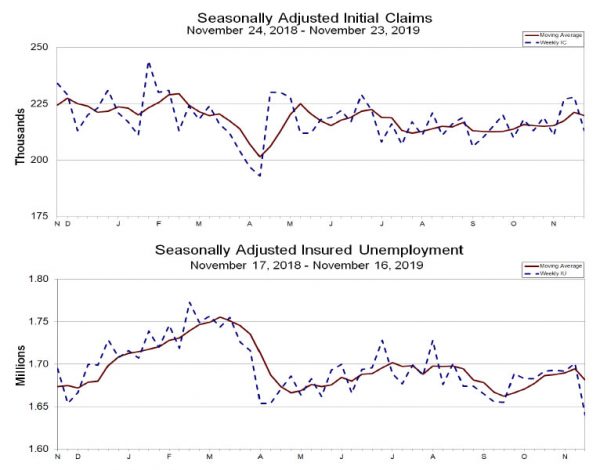
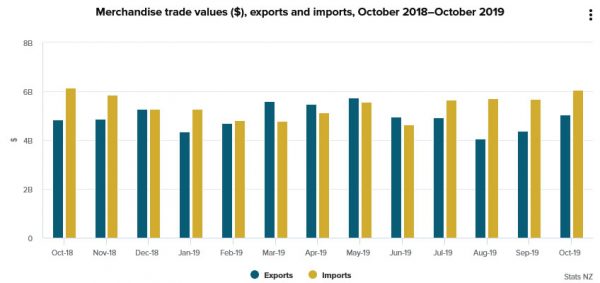
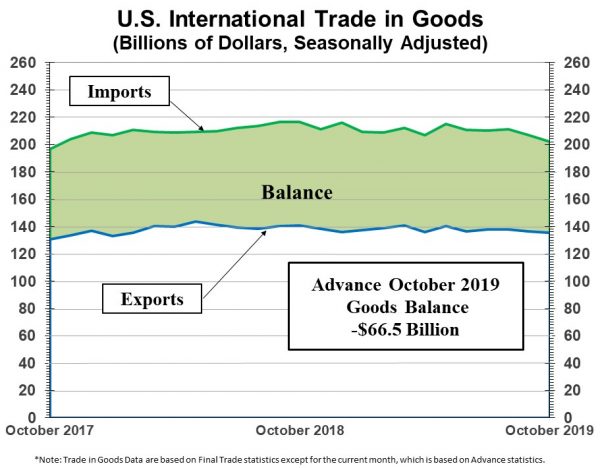
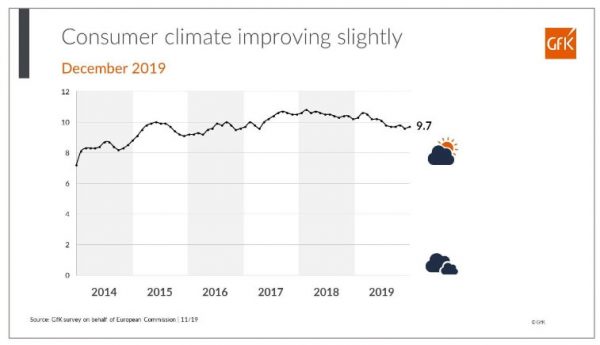

Eurozone economic sentiment imrpoved on consumer and retail trade
Eurozone Economic Sentiment rose to 101.3 in November, up from 100.8, beat expectation of 101.0. The improvement of sentiment resulted from slight increases in confidence among consumers (up 0.4 to -7.2) and retail trade managers (up 0.7 to -0.2). Confidence remained broadly unchanged in industry (up 0.3 to -9.2) and services (up 0.3 to 9.3).
Amongst the largest euro-area economies, the ESI increased in Spain (+0.7), France and Germany (both by +0.4), while it remained virtually unchanged in Italy (-0.1) and worsened in the Netherlands (−1.0).
Business Climate Indicator dropped to -0.23, down from -0.20, slightly better than expectation of -0.24. While managers’ assessments of overall order books and, in particular, past production deteriorated, their production expectations and assessments of the stocks of finished products improved. Managers’ assessment of their export order books remained broadly stable.